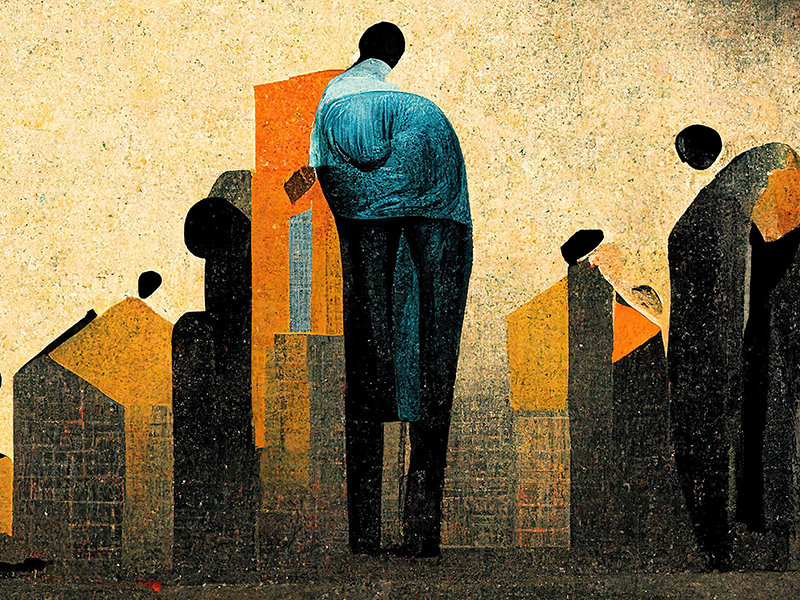Mandate for Justice: Inside and Outside
“Race”: The Basis of Social Injustice

By Rev. Dr. Peter Wherry
Relevant Scripture Passages to Consider:
- Genesis 1:26-27
- 1 Samuel 8:11-17
- Isaiah 1:10-17
- Matthew 25:31-46
- Acts 2:43-47
Background to Consider:
- The concept of race is dangerous mythology.
- The mythology of race ascribes value to some physical differences over others. It has poisoned the air that we breathe, systemically fostering inequality, brutality, and violence.
- Race is the notion of the legitimacy of arbitrary, physical hierarchical categorization and, based on that hierarchy, the privilege of some and the disadvantage of others.
- One evil of this mythology is that it continues to determine the social and economic outcomes of entire groups of Americans, perpetuating unfairness, division, and death, even 22 years into the 21st century.
- The mythology of race is universally harmful. The acceptance of the legitimacy of race as a category has injured not just Americans of color, but all Americans, as it has promoted division, undermined social justice and economic prosperity, and rendered nearly extinct the unrealized ideal of national harmony.[1]
- Specifically, the concept of race has legitimized individual and collective forms of bias and served as the justification for various forms of human degradation, social inequality, and structural injustice.
Conclusion:
- Race is a synthetic idea.
- The synthetic idea of race has a definite genesis in the Enlightenment period.[2]
- Although there is evidence of racialized thought as early as the seventh century in China and the eighth century in Japan, race as an academic and codified construct was conceived and empowered by people in an earlier era to foster the oppression/control of other human beings (especially following the attenuation of the slave trade as a large-scale industry in America).
- Human beings have the power and the responsibility to eradicate race and its demonic younger—and mostly American—sibling, racism.
- We must eradicate race and racism because it is the only means of saving the republic. Moreover, we must eradicate both race as an idea and racism as a practice because it is the only way to inhabit the Kingdom of God and to live in Beloved Community.
Discussion Questions:
- Was any of this information new to you? If so, what information was new?
- Was any of this information surprising? If so, in what ways?
- What are the differences and the commonalities between race and racism?
- What do you think it means to see race as a modern invention?
- How do you think economics relates to the idea of race and the persistence of racism?
- How does continuing to accept the idea of race hinder the gospel and the vision of Beloved Community?
- What solutions might there be from within the traditions of the church to overcome racism?
[1] See chapter five of Carol Anderson, White Rage: The Unspoken Truth of our National Divide (New York: Bloomsbury, 2017), 138-160. In this chapter, Anderson explains in chilling detail the backlash and paranoia of White Americans as a reaction to Black ambition exemplified in the election of Barack Obama as president of the United States.
[2] Robert Hood, Begrimed and Black: Christian Traditions on Blacks and Blackness (Minneapolis: Fortress Press, 1994), 10. Hood details that race as a concrete sociological and academic idea can be traced to the work and writings of several Enlightenment thinkers: French physician François Bernier (1620-1688); Carolus Linnaeus (1707-1778), who taught that a scientific correlation existed between a person’s intelligence and their outward appearance; and the German founder of modern comparative anatomy, physician Johann Friedrich Blumenbach (1752-1840). Blumenbach taught that the comparison between Greek skulls and those of Africans represented a different and superior standard of beauty and a higher culture for Greeks, compared to Africans. Joseph Arthur de Gobineau (1816-1882) wrote that Nordic “races” are by nature superior to Semitic and Black “races.”
The Reverend Dr. Peter M. Wherry is a native of Buffalo, New York. He received his early education in the schools of the Catholic Diocese of Buffalo, graduating with honors from the St. Joseph’s Collegiate Institute. He earned with honors, the Bachelor of Arts degree in Social Work and Gerontology from Virginia Union University and also the Master of Divinity degree from the Samuel DeWitt Proctor School of Theology at Virginia Union both in Richmond, Virginia. He earned the Doctor of Ministry degree from the Wesley Theological Seminary in Washington, D.C.
He is author of numerous published works including a groundbreaking devotional book in the year 2000, co-authored with his wife, Dr. Wanda H. Wherry entitled, A Door of Hope. In 2013, his book Preaching Funerals in the Black Church: Bringing Perspective to Pain was published. Wherry has led churches in both rural and urban settings including the Pleasant Plain Baptist Church in Drewryville, Virginia, the Fountain Baptist Church in Richmond, Virginia, and sixteen years as pastor of the historic Queen Street Baptist Church in Norfolk, Virginia. In 2007, he became pastor of the Mayfield Memorial Missionary Baptist Church of Charlotte, North Carolina.








